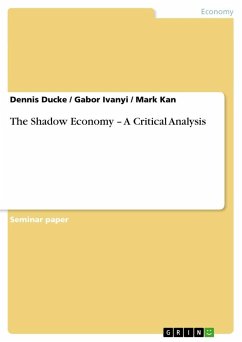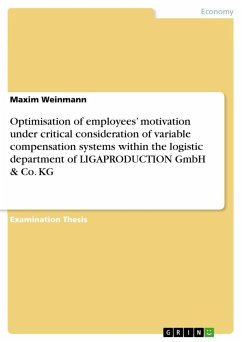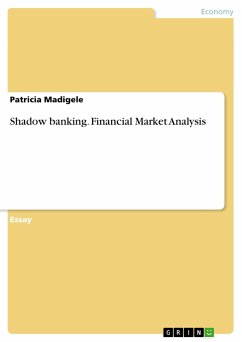Seminar paper from the year 2008 in the subject Business economics - General, grade: 1,3, University of Applied Sciences Essen, language: English, abstract: According to the "Focus" magazine approximately 13 million Germans contributed to the shadow economy in 2006! The estimations of Friedrich Schneider, one distinguished expert in this area, showed that the extent of the shadow economy in Germany in 2007 was about 349 billion Euros, which equals to 14.7 percent of Germany's gross domestic product (GDP)! The scope of the present assignment is to provide an all-embracing and critical overview of the shadow economy, to introduce the main causes, effects and dimensions of the shadow economy and to find answer the question how shadow activities can be limited. In this context the hidden sector can be defined as all economic activities that are not recorded in the national accounts, but normally should be a part of them and be included in GDP. These actions can be on the one hand absolutely legal in the self-sufficient economy like do-it-your-self, neighbourhood help, but on the other hand completely illegal activities like dealing with drugs and smuggling as well as legal activities, which are illegally being carried out, e.g. tax evasion or illicit work. The main and most vital reasons for the existence and constant growth of the shadow economy are high taxes or social security contributions burden and the intensity of state regulations. But also sociological-psychological causes like subjective perception of tax burden, falling society values, a bad tax morale and declining loyalty towards the state can have a tremendous impact on the size of the hidden economy. But is the shadow economy a threat to the official sector? At first glance, the question whether the shadow economy is dangerous might appear strange. However, there are several controversial opinions about this matter. The analysis of the effects caused by the existence and the growth of the shadow economy is a contradictory topic. The present assignment characterizes the main negative, e.g. distortion of official economic statistics, lower tax revenues and positive effects, e.g. price stabilization, creation of new jobs of the shadow economy and their influence on the national economy. Following this, the study presents the most popular methods of measuring the shadow economy: direct methods that are mostly based on surveys, the indirect ones that attempt to quantify shadow economic activities by seeking traces left in the official sector and the so-called model approach, which tries to determine the hidden economy by ...
Hinweis: Dieser Artikel kann nur an eine deutsche Lieferadresse ausgeliefert werden.
Hinweis: Dieser Artikel kann nur an eine deutsche Lieferadresse ausgeliefert werden.








